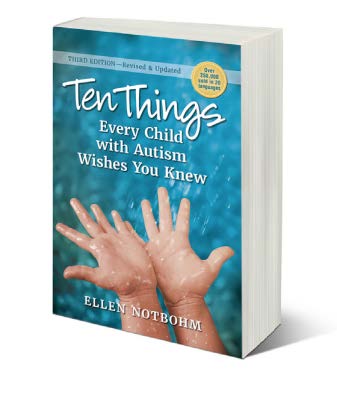YOUR OF POWER OF CHOICE
BY ELLEN NOTBOHM
- A. "Overwhelmed."
- B. "Paralyzed."
- C. "Crushed."
- D. "Scared."

Title: Ten Things Every Child With Autism Wishes You Knew 3rd Edition, Revised and Updated
Author: Ellen Notbohm Publisher: Future Horizons Publication Date: June 2019 Paperback: 155 pages ISBN-13: 978-1941765883 Available at fhautism.com , amazon.com and barnesandnoble.com
All of the above. These evocative words embody some of the first emotions to erupt in many parents of children newly diagnosed with autism. And no wonder, as we confront the sheer volume and weight of the decisions we now face and the bewildering range of choices within each decision, on subjects unfamiliar and unnerving. As time goes on, we find that the demands of having to make such choices never ends. Our child travels his or her developmental timeline, matures, outgrows choices and solutions that once worked, faces new challenges requiring us to search out or create new alternatives. Do we find those choices empowering—or A overpowering? Rare is the parent of a child with autism who hasn't at least once felt strapped to a pendulum reaching one of its polar apexes of too many choices, or no choices. This uncomfortable dichotomy leads to the same need—a way to make choices in which we can feel confident. Although we know intellectually that there are no perfect parents, and that mistakes and missteps are inevitable, we may also feel that we simply can't make mistakes, that there is too much at risk. We fear making the wrong choices.
We need strategies for making the best possible decisions, whether from a slate of inferior options or viable ones.
It's like a never-ending multiple-choice test. Fight or flight? Some parents facing (or fleeing) this avalanche of choice will search for the nearest escape route, and they'll easily find it. They can choose to allow others to make the many decisions necessary about their child's education and health. Absent parent input, school personnel will make decisions about a child based on many factors, some with heartfelt effort to act in the best interests of the child, some with expediency or cost-efficiency as the primary motivation. Parents can make the choice to accept without question the recommendations of therapists and clinicians, regardless of whether the advice is acutely individual to the child's needs, or generalized treatments and practices ("this is how we do it for all autistic kids").
But most parents and guardians I've encountered choose fight over flight. They step up to take the responsibility and the lead in making these choices. They recognize that in the ever-changing array of professionals in their child's life, parent/guardian stands as the constant. Teachers turn over annually, doctors and therapists change, caregivers, counselors and coaches come and go. It falls to the parent/guardian act as Information Central, to ensure that the aggregate knowledge and wisdom, the sum of the choices we've made for and about our child, passes s firmly into the hands of those who will play roles in the next chapter of his life and who will shape the next round of choices we must make.
But choice, that weight swinging from the pivot point of the pendulum, can arc to the converse side of feeling overcome by endless, numberless choices. Sometimes we can't see the forest or the trees. "I had no choice."
When I hear this declaration from parents, it's usually tinged with dejection, often fueled by melancholy, fear, anger. I just did an internet search for the phrase and got 23 million results. That's a lot of anguish, desperation, bleakness. It can swamp us when we reach junctures where we feel we have no choice but to take action against our schools, leave spouses/partners, cut off family members, resort to medication. Or we simply take no action because we feel we have no choices. (Doing nothing is a choice. Sometimes it may even be a sound choice.) When we say we have no choice, we most often mean we have no palatable choices. No attractive or appealing choices. No acceptable or practical choices. Or that we've exhausted all the choices we've been able to identify.
But crummy choices are choices nonetheless. Here's an example. A common no-choice conundrum for parents of autistic children is the family member or members who do not—choose not to—understand autism's effect on the child. They often voice strident criticism of behaviors, impatience with sensory challenges, refusal to modify methods of communication or to otherwise accommodate and respect the child's needs. "We have a few family members who crush my son's self-esteem every time they are around him," a parent will tell me. "My only choice is to ease them out of our lives, quietly."
This parent's choice is understandable, justifiable and even logical, but it was by far not the only choice. S/he could also have chosen to:
- • Confront family members aggressively. "Your refusal to accept how Ben's autism affects him is damaging him, therefore we will allow you no further contact with him."
- • Confront family members firmly but evenly. "I am sure you love Ben, but I don't think you realize how much your constant criticism hurts him. Until you can respect how Ben's autism affects him, it's in his best interest that he not be around you."
- • Continue to attend family gatherings and confront each instance separately. "That's the second time in fifteen minutes you've criticized Ben for something he can't control. If you do it again, we will leave immediately."
- • Take the passive-aggressive approach, cutting off contact with no explanation or communication.
- • Ask a sympathetic family member to intervene with the offending members. • Ask family members to attend family counseling.
- • Ask family members to accept information about Ben's autism from a professional, such as his doctor, teacher or therapist.
- • Ask the offending family members to propose a solution. "I can't allow your continued put-downs of Ben. What actions are you willing to take to change things?" With a little brainstorming, the "only choice" becomes "many choices."
When we explore the expansiveness of choice, we mine the value of summoning the patience and fortitude to consider the widest range of choices we can muster, individually and comparatively. Because seldom is the instance in which we truly have no choices... •
ABOUT THE AUTHOR:

An internationally renowned author and gold medalist in both nonfiction and fiction, Ellen Notbohm's work has informed, inspired, delighted, and guided millions in more than 20 languages. Connect with her at ellennotbohm.com and on Facebook, Instagram, Twitter, LinkedIn and Pinterest.